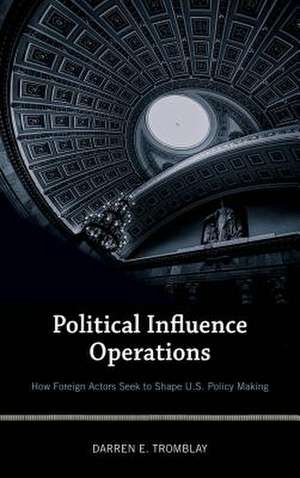POLITICAL INFLUENCE OPERATIONSPB
Autor Darren E. Tromblayen Limba Engleză Paperback – 30 apr 2018
Preț: 369.19 lei
Nou
Puncte Express: 554
Preț estimativ în valută:
70.65€ • 73.67$ • 58.72£
70.65€ • 73.67$ • 58.72£
Carte tipărită la comandă
Livrare economică 20 martie-03 aprilie
Preluare comenzi: 021 569.72.76
Specificații
ISBN-13: 9781538103319
ISBN-10: 1538103311
Pagini: 256
Dimensiuni: 152 x 229 x 20 mm
Greutate: 0.4 kg
Editura: Rowman & Littlefield
ISBN-10: 1538103311
Pagini: 256
Dimensiuni: 152 x 229 x 20 mm
Greutate: 0.4 kg
Editura: Rowman & Littlefield
Notă biografică
Darren E. Tromblay has served the U.S. Intelligence Community as an Intelligence Analyst for more than a decade. He is the author of The U.S. Domestic Intelligence Enterprise: History, Development, and Operations (2015) and coauthor of Securing U.S. Innovation (2016). Tromblay has been published by Lawfare, The Hill, Small Wars Journal, Intelligence and National Security, International Journal of Intelligence and Counterintelligence, and the International Journal of Intelligence Ethics. He holds an MA from the George Washington University¿s Elliott School of International Affairs and an MS from the National Intelligence University.
Descriere
Between overt diplomacy and armed conflict is a more subtle game of policy influence. Nation-states and non-state actors use a variety of means to encourage preferred decisions by the U.S. government. This book moves beyond sensationalist accounts of foreign influence over U.S. policy making to address a growing issue in security and intelligence.
